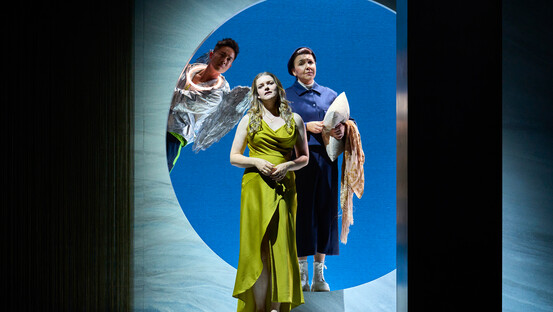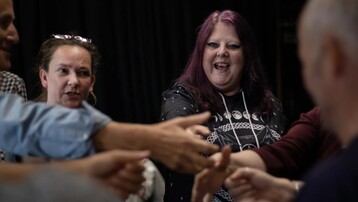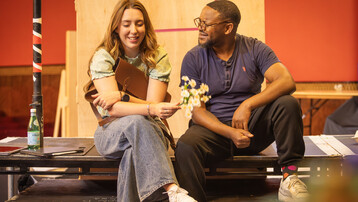News Story
Until a few years ago I knew little of this song cycle. I guess it was when I was preparing to direct Tchaikovsky’s opera Eugene Onegin that I set out to read everything I could of Pushkin in translation, and I came across theses poems, selected by cellist and conductor Msitislav Rostropovich and set to music by Benjamin Britten. I am ashamed to admit that they made little impression on me, musically, and that only in preparing these programmes over the last few months did I decide to listen to them with more attention. Now I cannot imagine feeling cool toward them; I think they are my favourite Britten songs!
They were written in 1965, when Britten and his partner Peter Pears holidayed in Armenia, guests at the Composers’ Village in Dilijan, in the company of their friends Rostropovich and his wife Galina Vishnevskaya. The anecdotes of the holiday are frequently re-told, and the photographs reproduced — the sort of Puskin’s clock chiming in sympathy with the accompaniment during the last song, when Britten played it in Leningrad on Pushkin’s piano, the excellent holiday snapshots of these two power couples. I was interested to learn in the fine Red House film that the 4th song features Armenian harmonies, and that Britten was influenced by Armenian composers to whose work he would have been introduced.
What is of more particular interest to me is the selection and setting of the poetry. Apparently Britten set the Russian pronunciation of Rostropovich, working from a translation in a two language edition; at the same time Pears prepared an estimable English language singing version, no mean task. We were lucky enough to work in the room with Sergey Rybin, who pointed out the precise and other meanings of the Russian.
I have heard it said that the poems are not alike, and that there is no unifying theme in the selection. I do not find this to be true. Four of the six meditate on the poet’s craft and calling — the artist’s craft, more generally. The poet it is obsessively explained, reflects the world back to the world, having found in it all that is most beautiful and base; thus sacrificing him or herself to this solitary vocation, like a lonely shepherd the poet or composer answers nature, freely. But what is the reply? Nothing. Thus the artist examines, listens, creates — and the poem goes unread, the song unheard, the truth of that creation unrecognised.
This case, stated in the first song, ‘Echo’, is refined in the rapturous second song, depicting the heart awakened to passion, unexpressed, and then in the ironic depiction of the gentle angel of creation and the subtle, envious angel of negation. In this case the artist ponders, with prudent ambivalence, the nature of artistic inspiration: is it the voice of and angel that speaks, or the toad at the ear of Eve? Britten’s serpentine piano figures contrast with the luminous chords associated with the warm light of creation — and even Lucifer acknowledges there must be some beauty, after all, in human kind. I certainly see method in Rostropovich’s selection, just a decade before his exile, recalling that as a student Rostropovich had quit the Leningrad Conservatory when Shostakovich was dismissed, that in 1970 he sheltered the disgraced Solzhenitsyn. The ironic, narcissistic, withering gaze on art and artists had taken its toll, even though great artists were trained and masterpieces were created, lights in darkness.
The wonderful fourth song describes the power of the nightingale’s song of love for the rose, depicted in the strange, dissonant chords punctuating the garden’s hushed stillness, and then in the ecstatic outbursts of the voice. The rose merely sways, unintelligent, beautiful, heedless. The poet should beware, sacrificing like a nightingale on a thorn for love of beauty — the rose flowers, merely, and the poet’s call the rose will never answer.
Over and over again, the poet complains that there is no answer, no understanding. In the ingenious setting of ‘Lines written during a sleepless night’ there are voices, but they have no meaning, and they merely torture — scratching of mice, mumbling fates, whispers of waste (suggesting possibly the voices of critics!). “Answer me, I long to hear!” — but no sound comes back but the meaningless ticking, the chronicle of loss.
Rostropovich was daring in his selection of the outrageous, short fifth poem, the ‘Epigram’ relating to Pushkin’s chief in Odessa, the corrupt Count Vorontsov. More a howl than a song, it calls out authority based on ignorance and rank, utterly inadequate to responding to the work of an artist — as Shostakovich set in the climax of his version of Shakespeare’s Sonnet 66 (the line that his students looked forward to hearing) “…art made tongue tied by authority”.
As we rehearsed this piece we thought over an over again of the poet’s reflection, of the poet’s lonely, vain anticipation of a response. We talked about the silenced artists, the coding that goes on in making art, the good and the bad angels in each artist. For some reason it sent me back to read Akhmatova (celebrated in the last of Shostakovich’s Tsvetaeva songs), derided as nun and as whore by totalitarian toadies, steely biding in Leningrad, and then to recall the misery of dandy Pushkin, plaything of the Tsar (Alexander I, brother of the “poet-murderer” Tsar Nicholas I, nightmarishly decried in the fourth of those songs).



